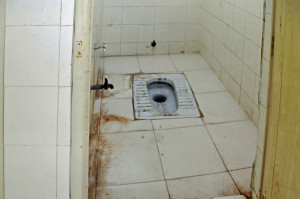Because I will be writing about foreign travel, I thought it would be a good idea to get one important subject behind us right away – toilets. As travelers to points east of about Italy and Greece have learned, when nature’s call comes far from places frequented by westerners, the result can be charitably described as a “cultural experience.” What visitors often find is little more than a hole in the floor, with a water hose sometimes hung nearby. They soon discover that the hose is not just for washing down the floor and that if they don’t want to learn how to use it for its intended purpose they should carry their own tissue. If they have forgotten and the stars have aligned, they may find an entrepreneurial young person who will sell them a handful of wadded up facial tissues for whatever is the going rate. They then have to get used to the idea of throwing the tissue into a little basket that is sometimes placed near the hole for just such a purpose and, if they are lucky, was emptied less than a week ago.
Like many Americans would, I assumed that once people in such places learned about the western miracles of flush toilers with seats and squeezably soft paper, they would quickly abandon their old ways. So I was surprised with what I saw when we were about to leave the international airport in New Delhi. Identical doors near the security lines were marked “Eastern” and “Western” and they were not the names of airlines – they identified the type of facility behind the door. Many of the passengers, whose familiarity with western culture was trumpeted by their stylish jeans and sneakers, nonetheless chose the door that opened to a hose and a hole in the floor. Not recognizing at the time how arrogant and condescending this must have sounded, I asked our guide why so many people still preferred the “Eastern” door. His answer was as matter of fact as it was enlightening – “It is hard to convince most people here that it is appropriate to sit on a seat that someone else has just used and to put their hands in places their mothers have taught them to avoid.” I had no more questions.
International travel provides a variety of learning opportunities, from the big ones about our history to the little ones about our cultural biases. That is why we travel. In future columns, I will try to provide some of the other lessons that we have learned. But there will be no more talk about toilets – I promise.
